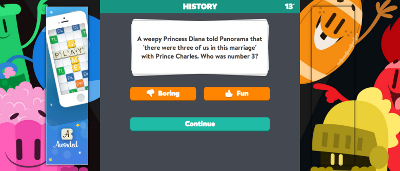
When you think of blockbuster mobile app games, you normally think of huge hollywood budgets, million dollar special effects and 10s of thousands of hours of mobile app development effort.
The reality is, some of the biggest iPhone Apps and Android Apps are nothing of the sort – they are simple ideas which caught on, earning a fortune for their creators.
One of the biggest games to date is Trivia Crack – a mobile app based on the old favourite Trivial Pursuit.
According to Venture Beat
After catching on big time in the U.S. and Canada, Trivia Crack has expanded to countries like U.K. — and this is helping fuel its domination of the mobile app markets.
Trivia Crack is the top downloaded game on mobile in the world, according to developer Etermax and industry-tracking firm App Annie. Since its debut, this app has racked up more than 125 million downloads worldwide. It has also managed to reach the No. 1 spot on the overall app download chart in important countries like the United States and Canada. With mobile gaming revenue reaching $25 billion in 2014, Etermax carved out a piece of that for itself by appealing to casual players with a trivia app that hooks heavily into social media.
Trivia Crack pits players against their friends in a Trivial Pursuit-style quest of knowledge. It already has over 200,000 unique questions, and — thanks to its players — it gets 2,000 new questions every day.
Important Lessons
There are some important lessons we can learn from the success of the Trivia Crack game.
- The use of social media – friends challenge each other via social media, which helps to propel the explosive growth of app users
- The enlistment of users to supply new questions – these guys don’t even have to think up new questions themselves, they get their users to do it for free.
- Simplicity – the game doesn’t pack in every imaginable feature, or heavy servings of Hollywood Glitz, it is just Trivial Pursuit, with a few adaptions to make it more attractive in a mobile app environment.
If you have an idea for developing an iPhone App Game or Android App Game, and you are worried that your idea is too simple to work – please don’t let that stop you. Because when appealing to mobile users who are snatching a few few seconds from their busy schedule, simple is good. And if users like your idea, you could have a runaway success on your hands.
Contact Me to discuss your mobile app development idea now.

